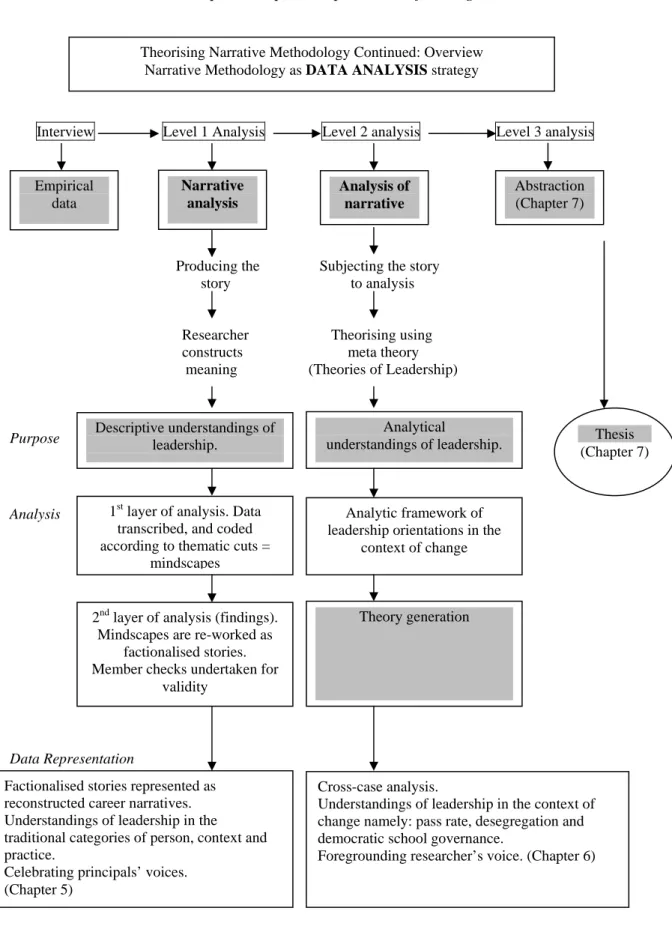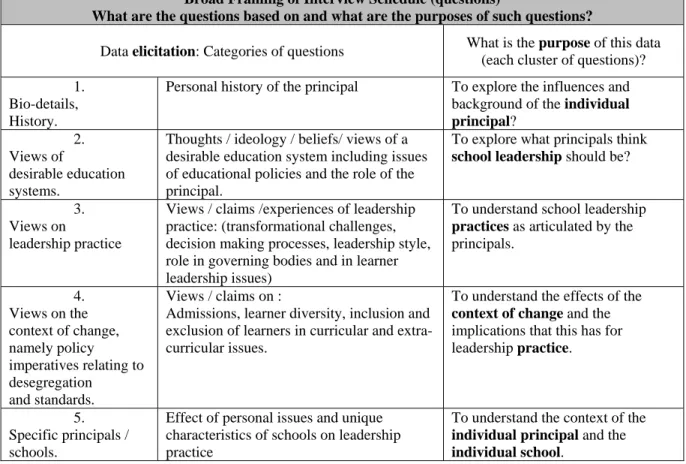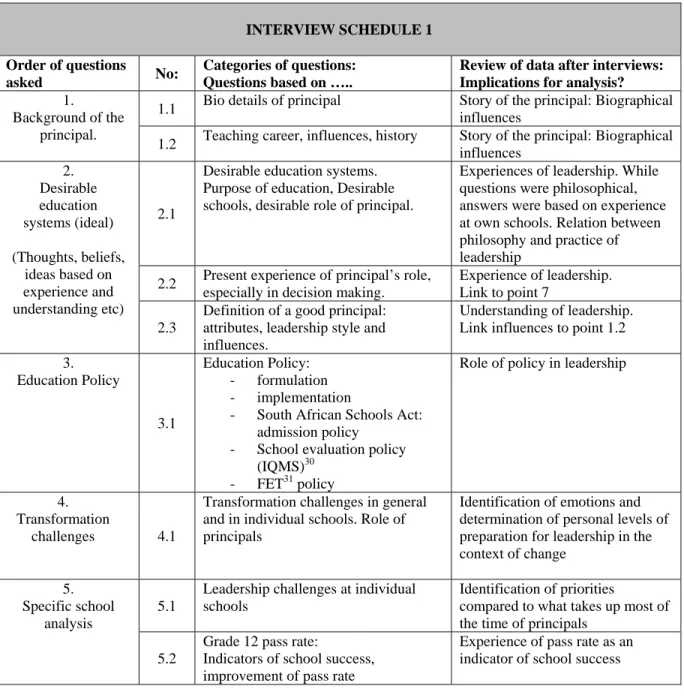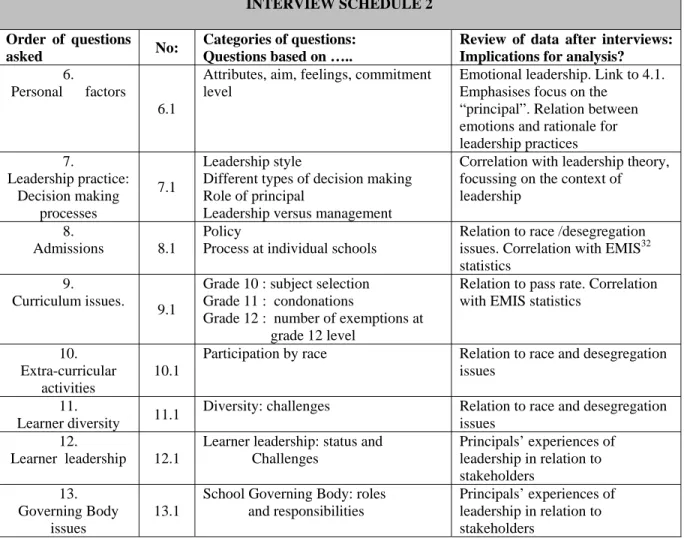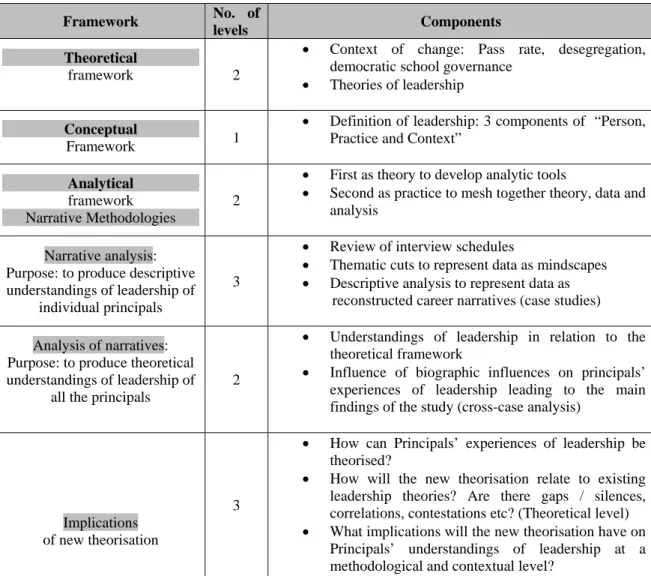This refers to the democratically elected Council made up of representatives from each class of a school. This is part of the "old" terminology that refers to current twelfth grade classes.
Introductory Remarks
Exactly where you go as you spin is, of course, completely determined by your genes and the various physical forces acting on you. But it is also completely determined by your completely inscrutable whims from one moment to the next.
Rationale: My Professional Story (Narrative)
I began to wonder about the high performance of other schools in the eThekwini region in general. What are principals' experiences of managing schools in the context of change in South Africa?
Overview: Orientation to the Chapters
The purpose of the critical question is to explore principals' experiences of managing a school in the context of change. In the second part, I discuss how the theorizing methodology was implemented in this study (practice).
Political Change - Globalisation and Democratic Governance
Critique of the Changed South African Education System
This shows the need for a study in "under-resourced schools" in South Africa and I make this one of the main criteria in the selection of schools in the sample of this study. In addition to criticism of the impact of globalization on the education system and the adoption of OBE, there is also criticism of South Africa's seeming over-support.
Policy Change - Educational Policies
First Education Policy Imperative - “Equity”
In the South African school management literature, there is little mention of the racial issues between "Indians, Coloreds and Africans". The concept of inclusion and exclusion raises questions about self-conscious considerations about the principals' roles and identities (Sayed, 2003).
Second Education Policy Imperative - “Standards”
In contrast, the persistence of the benchmark-based move in the pass rate reduces the amount of risk-taking. Sergiovanni (2001) argues that the role of the school principal is essential to the issue of efficiency in schools.
Concluding Thoughts: Theoretical Framing (Part 1)
Key Constructs Relating to Change
- Power and Change
- Culture and Change
- Resistance to Change
This overview of the "context of change" would not be complete if the issue of resistance to change was not raised. How principals relate to resistance to change is carefully considered in this study of exploring experiences of leadership.
Theoretical Landscape of School Leadership
- Theories of Leadership
- Transformational Leadership
- Emotional Leadership
- Distributed Leadership
- Ethical Leadership
- Validation Rewards
- Financial Rewards
- Status Rewards
- Internal Rewards
- Internal Rewards versus External Rewards: The Controversy The development of school leadership theories started with appropriating The development of school leadership theories started with appropriating
This definition focuses on both the "practice" of leadership and the "personality traits" of the leader (principal). How to structure the literature review related to the theoretical field of leadership theory. How do the above cultural norms of the principal's role relate to leadership experiences?
Analyzing Fullan's (1995) advice, I raise the question of the role of principals' personal reflections on their leadership experiences. Another critique of emotional leadership theory raises the issue of the agenda of emotional intelligence protagonists. Proponents of the theory of distributed leadership emphasize that leadership is not the prerogative of the director alone.
Learning about Rewards: Learning Theories
Cognitivism relies on an internal schema or internal structure of knowledge that will determine learning and determine how reward is learned. This knowledge is actively constructed from past experiences with rewards and learning about rewards to create a personal interpretation of the world (Mergel, 1998). Educational psychologists also add humanism as another learning theory, which argues that learning about rewards occurs primarily through reflection on personal experience and that learning occurs as a result of intrinsic motivation (Conner, 2007).
What implications do these learning theories have for how principals understand the rewards of leadership? However, it is mainly through the reflection of personal experiences and its relevant relation to reward structures that determines how principals learn to understand leadership.
Theoretical Framing (Parts 1 &2)
The theoretical framework derived from this forms the parameters within which the lens is developed to guide the methodology and develop an analytical framework (Chapter 4) that will answer the critical question.
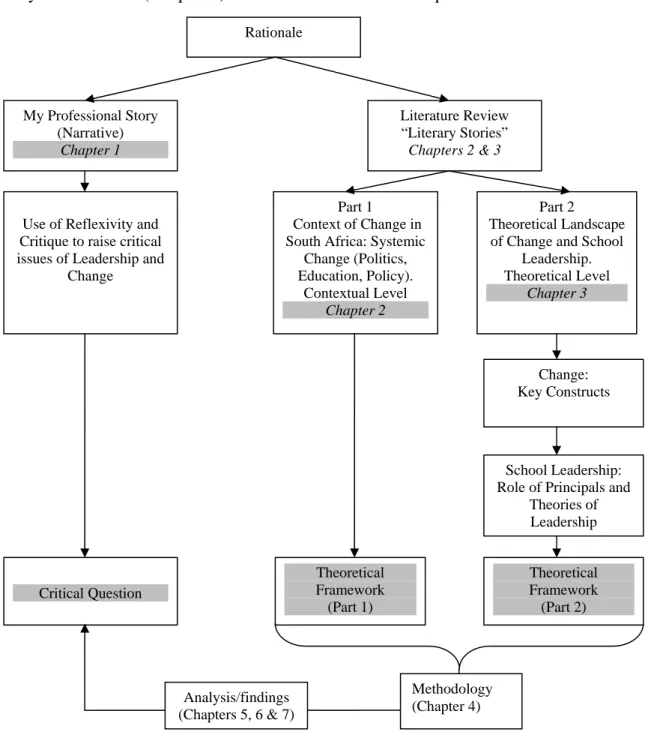
Introductory Remarks
To translate this dialogue into data, I opted for a narrative approach and chose school principals as the unit of analysis in this study. Phendla (2004) has effectively demonstrated how certain life experiences influence individuals in their professional lives and this provides the basis for exploring the experiences of school leaders through their stories. Because life experiences are embedded in memory (Soudien, 2006b), principals' constructions of reality can be used through their memory to explore leadership experiences.
In this study, I argue for the use of narrative methods to explore experiences of leadership by highlighting the "personal" challenges of school leaders. In the first section of this chapter, I theorize the use of narrative methodology as data production and data analysis strategies. In the second part of this chapter I discuss how the theorization of the methodology was implemented in this study (practice).
- Introduction: Limits and Potentialities of Narrative Methodologies
- Why Narratives?
- Narrative and Identity
- Narrative Methodology and Validity Concerns
- Narrative Methodology as Data Production Strategy
- Narrative and Telling: Co-construction of Narratives
- Narrative and Discourse: From Interviews to Text
- Narrative Methodology as Data Analysis Strategy
To address the gap in the qualitative research base on leaders and leadership, I rely on the use of narrative methodologies in this study. Research on narrative methodology as an analytical strategy highlights issues of "identity" as an important consideration. It may seem strange to relate the use of narrative methodology as a data production strategy in the social sciences to that of other fields such as medicine (Charon, 2000) and social movement (Kane, 2001).
In order to obtain data in "narrative", the interviews must be consistent with the narrative methodology chosen for this study. To conclude this section, I present an overview (in Figure 2) of the use of narrative methodology as a data production strategy in this study. To conclude this section, in Figure 3 I present an overview of the use of narrative methodology as a data analysis strategy in this study.
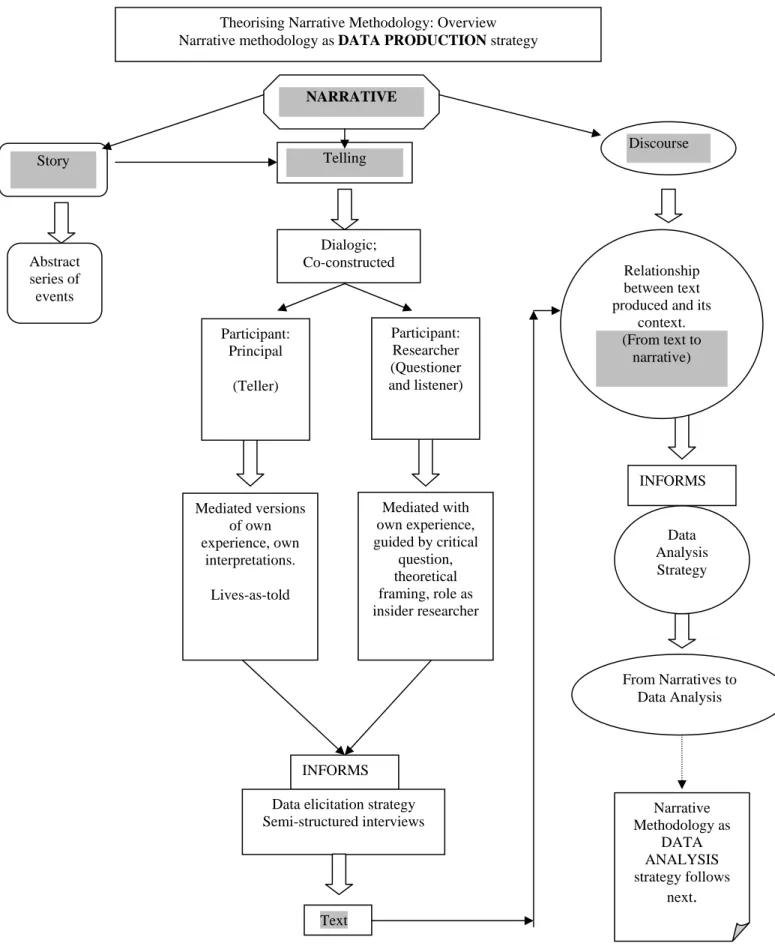
Narrative Methodology: From Theory to Practice
- Selection of Sample
- Data Production Strategy
- Data Analysis Strategy
- Methodological Coherence of the Study
- Limitations of the Study
Two sets of semi-structured interviews with each of the six principals in the sample. Does the director's appointment status or experience make a difference to leadership experiences? Would principals' responses be different if the school context hypothetically changed?
The detailed analysis of the interview data alone adequately answered the critical question. The three principals had no problem with the way their stories were written. Therefore, in Chapter 6, I changed the focus of the analysis to the context of changes in leadership experiences.
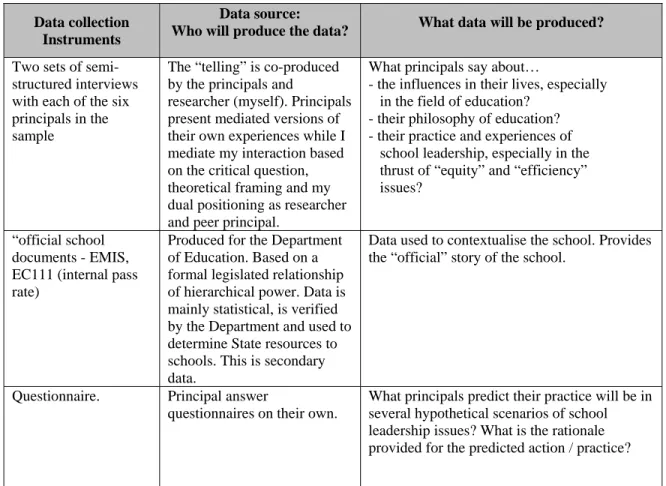
Concluding Thoughts
And when you tell the story, well, it all falls into place, it all has a beginning and an end.
Introductory Remarks
Within this biography, I pay attention to the principal's gender, experience as a principal, age, and racial classification. This is especially evident because of the organizing framework that I used to reconstruct the stories. It is this version of the stories that principals had read and agreed to be used in this study.
Furthermore, these stories serve as important reference points in the absence of voluminous, coded, raw data sets. In the co-production nature of this thesis, the representation of these stories reflects a deep respect for the voices of the participants being heard. It is also for this reason that I include the stories of the three remaining directors (Mr Mann, Mr Naidoo and Mr Ingle) in the sample in the appendix.
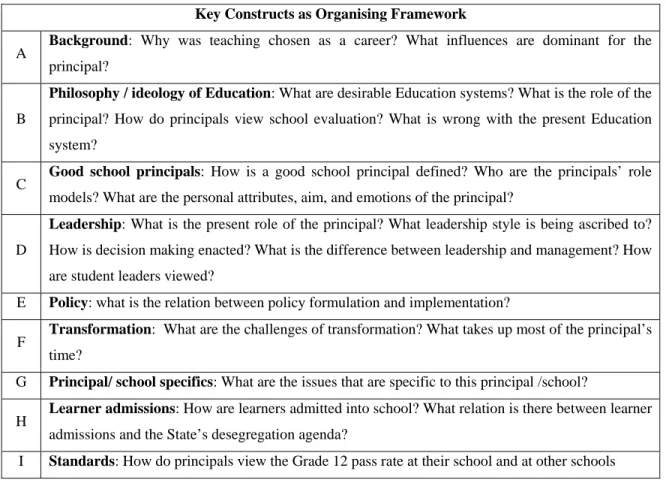
Reconstructed Career Narratives
Mrs T. Renton: Leading from the Front
It is far from it in most respects, but it is a fact that we adhere to many of the old norms and requirements. It's not worth even going through a disciplinary hearing because at the end of the day the principal loses. I know the department likes to tell us how it's not expensive, but that's because of the resources you need.
I often show anger or irritation and I don't think it's good, but I lead from the beginning. But they understand it, they see why it needs to be done, and they will support me if they see it is for the good of the school. These are big decisions that are made when we have to spend large amounts of money, make structural changes to the school and so on.
Mrs G. Thembani: Working with God and Waiting
I was the only Head of Department here after the principal and the deputies left because of the problems at this school. At the end of the day, they said that I should trust them; they are going to work on this thing. So now, at the end of the day it's all of us in this thing together.
It is because of the support we have from the governing body that we manage. In fact, I think it was fear of the unknown and fear of problems that I have seen other principals in the past encounter at this school. What we have realized is that students are so afraid of the counselor.
Introductory Remarks
Orientation
I use the term "performance" in this study specifically to refer to the final exit exam performance (twelfth grade) of the schools in the study. The twelfth grade exams are "external" exams (administered by the provincial government, but the national government has begun to take more control)59. For this reason, many consider a school's twelve-grade performance to be an "objective" measure of a school's effectiveness.
This view is reinforced by the annual publication of the pass figures of schools as league tables in the local newspapers. This is followed by the department's extravagant "Awards Ceremony" which celebrates and recognizes principals and schools with high pass rates. The pass rate is not my focus, but principals' experiences of school leadership in the context of the pass rate is my focus.
About Validation and Experience
- Successful Schools and Experienced Principals
- At-Risk Schools and “New” Principals
- Awarded Schools and Recent / Caretaker Principals
The pass rate was very different at the schools where Syed and Ingle were first appointed principals. Ingle sees his role as primarily responsible for maintaining the high pass rate. Ingle, unlike Syed, focuses on "teaching" in the classroom as the way to maintain the school's high pass rate.
Like Renton, Mann also questions the role of Department policies and their effect on pass rates. This creates a tension between his social justice agenda and his view of the importance of passability. Naidoo is a transformational leader and he sees the pass rate as a benefit to students.
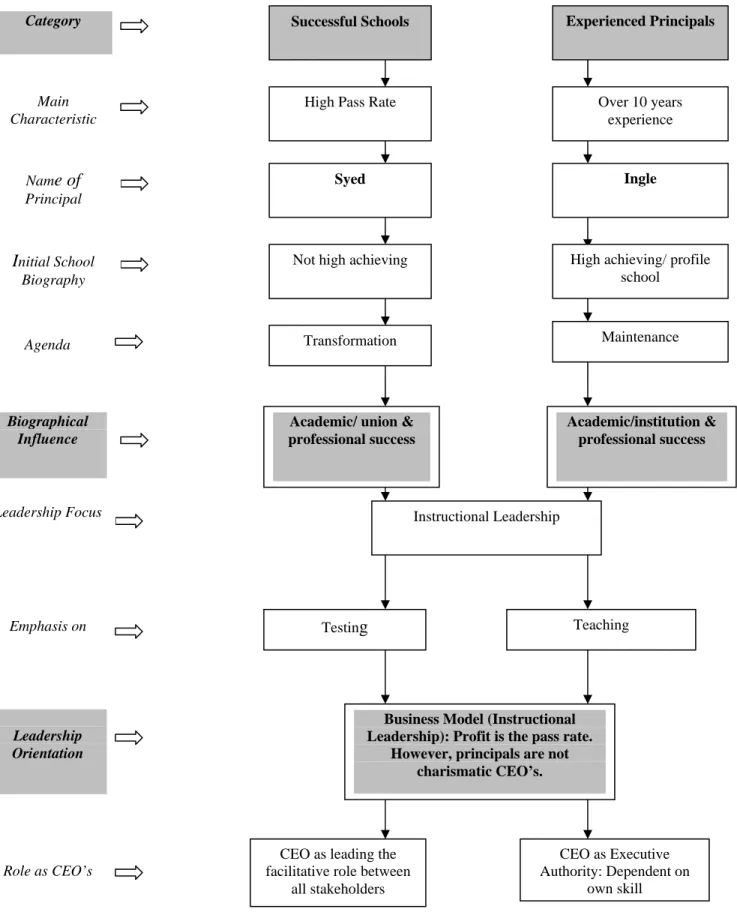
Experiences of Leadership in the Context of the Pass Rate
